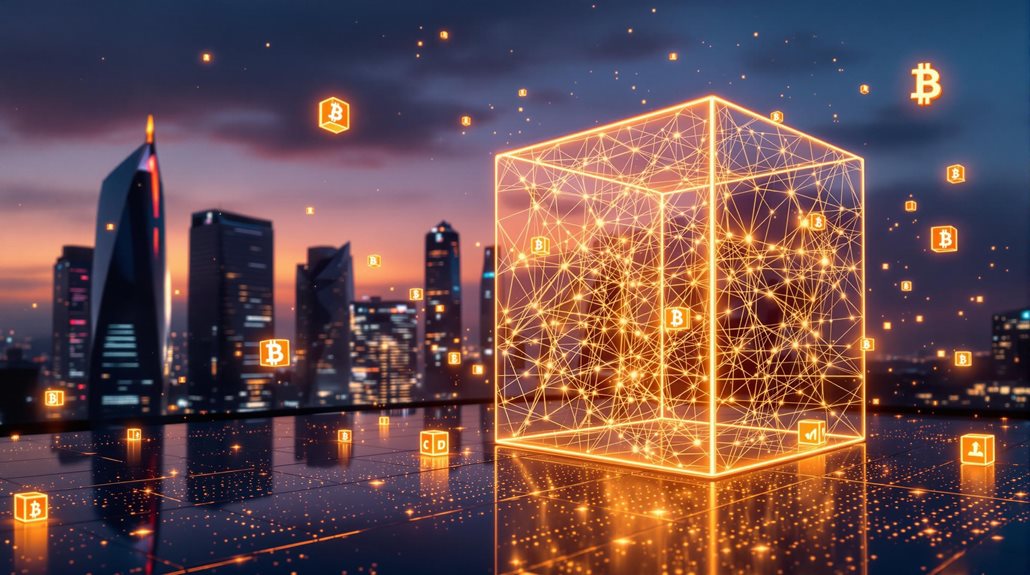DeFi (Decentralized Finance) is a new financial system built on blockchain technology that doesn't need banks or brokers. It uses smart contracts on networks like Ethereum to handle financial services like lending, trading, and insurance automatically. Users keep control of their funds through special wallets and can earn higher interest rates than traditional banks. While DeFi offers exciting possibilities, it also comes with risks like market volatility and technical challenges that users should understand.

While traditional banking requires middlemen like banks and brokers, decentralized finance (DeFi) in cryptocurrency doesn't need them at all. Instead, DeFi uses special computer programs called smart contracts that run on blockchain networks, mainly Ethereum. These smart contracts automatically handle financial services like lending, borrowing, trading, and even insurance without any human intermediaries getting involved.
DeFi works through open-source software that's maintained by communities of developers rather than big companies. It's designed to create financial markets that anyone with an internet connection can access. Users don't need to fill out applications or provide personal information to use DeFi services, making it more accessible than traditional banking. The open-source nature of DeFi platforms drives rapid innovation and development of new financial products. The total value locked in DeFi protocols has reached approximately $105 billion.
The system includes several key components that work together. Decentralized exchanges, or DEXs, let people trade cryptocurrencies directly with each other. There are also lending platforms where people can lend or borrow crypto assets. Traditional banks are starting to create their own DeFi products to stay competitive in the evolving market. Stablecoins, which are cryptocurrencies tied to the value of regular money or other assets, help make transactions more stable. Some users participate in yield farming, which involves moving crypto assets around to earn the highest possible returns.
One of DeFi's biggest advantages is that it gives users complete control over their money through non-custodial wallets. This means no bank or company holds their funds. Users can move their assets whenever they want without asking permission or paying high fees. The system is also transparent since all transactions are recorded on public blockchains where anyone can see them. DeFi wallets utilize public-key cryptography to ensure maximum security and privacy for users.
However, DeFi isn't without its risks and challenges. Transaction fees can change dramatically, especially on the Ethereum network when it's busy. The value of DeFi investments can be highly volatile, going up and down quickly. There's also uncertainty about how governments will regulate DeFi in different countries. Smart contracts can have bugs that hackers might exploit, potentially leading to lost funds.
Additionally, the technical nature of DeFi can make it difficult for everyday users to understand and use effectively. Despite these challenges, DeFi continues to grow as an alternative to traditional financial services. It offers features like privacy through pseudonymous transactions and often provides higher interest rates than conventional banks.
The system represents a significant shift in how financial services can be delivered, moving away from centralized institutions to a more open and accessible model.
Frequently Asked Questions
How Secure Are Defi Protocols Compared to Traditional Banking Systems?
DeFi protocols and traditional banking each have their own security strengths and weaknesses.
DeFi's smart contracts and blockchain technology offer transparency and eliminate single points of failure, but they're vulnerable to coding bugs and crypto scams.
Traditional banks provide FDIC insurance and strict regulations that protect consumers, but they're centralized targets for hackers.
While DeFi's security improves through audits and testing, it still lacks the established safety nets of traditional banking.
Can I Recover My Funds if I Lose Access to My Defi Wallet?
Recovery of DeFi wallet funds depends entirely on having the recovery phrase. If someone has their recovery phrase, they can restore access to their wallet on any device.
Without it, the funds are permanently lost – there's no customer service to help reset passwords or restore access.
That's why it's essential that users keep their recovery phrase stored safely offline. No third party can retrieve lost funds.
What Are the Tax Implications of Participating in Defi Transactions?
DeFi transactions have tax implications in most countries. The IRS treats crypto as property, which means swapping tokens or earning rewards can trigger taxes.
When someone sells crypto, they may owe capital gains tax. Income from staking, yield farming, and liquidity pools is often taxed as regular income.
Airdrops and hard forks are usually considered taxable income too. Tax reporting is required for all virtual currency transactions.
Which Defi Platforms Have the Lowest Transaction Fees and Gas Costs?
Several platforms stand out for low transaction costs.
Layer 2 solutions like Polygon and Optimism offer near-zero fees and massive gas savings.
Alternative blockchains like Solana and Algorand process transactions for less than $0.01.
DEX aggregators such as 1inch and Matcha help users find the cheapest trading routes.
DeFi platforms like dYdX provide gas-free trading on layer 2, while Curve Finance keeps costs low for stablecoin swaps.
How Can I Identify and Avoid Defi Scams and Fraudulent Projects?
DeFi scams can be spotted through several warning signs.
Anonymous team members, unrealistic profit promises, and missing security audits are common red flags.
Many fraudulent projects use "rug pulls," where developers vanish with investors' money, or "honeypot" schemes that prevent users from selling tokens.
Fake websites often mimic legitimate platforms to steal login details.
Smart contract vulnerabilities can also be exploited through flash loan attacks.
Community research and code verification help identify scams.





